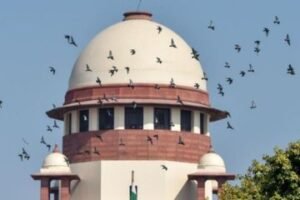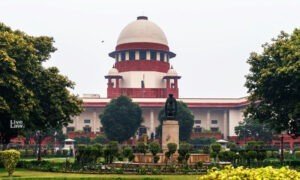‘Legitimate Legislative Exercise’: Supreme Court Dismisses Plea Challenging Tamil Nadu Land Acquisition Laws Act 2019
Case: G. Mohan Rao vs. State of Tamil Nadu
Coram: Justices AM Khanwilkar and Dinesh Maheshwari
Case No: [WPC 1411 OF 2020]
Court Observation: “We hold the 2019 Act to be a legitimate legislative exercise and find it to be consistent with and within the four corners of Article 254 of the Constitution of India and also of the High Court judgment.”
“Suffice it to observe that when voidness is a result of repugnancy between the State law and law made by the Parliament, that is, voidness under Article 254 of the Constitution, the revival of such State law by enacting a subsequent amendment substantively changing the basis of the voidness and applying it retrospectively from a prior date is recognized time and again by this Court, as discussed above. We say no more.”
“We may now consider the argument that the 2019 Act does not remove the defects found by the High Court and thus, lacks determinative principle thereby making it arbitrary. The 2019 Act is a conscious attempt by the State legislature to bring four material aspects of land acquisition under the three State enactments at par with the 2013 Act i.e., compensation, rehabilitation, resettlement, and infrastructure facilities.
No doubt, certain features of the stated law made by the Parliament have been left out, but that debate does not fall for our consideration as the vires of the 1997 Act and 2001 Act are already under consideration in the batch of SLPs, as already pointed above. To say that failure to import all provisions of the law made by the Parliament in the State enactments results in non-removal of defects pointed by the High Court is nothing but a palpable misreading of the judgment of the High Court.”
“Whereas, the judgment of the High Court does not even point out the absence of compensation/rehabilitation/resettlement/infrastructure related provisions as a defect in the State enactments. It nowhere points out the exact provisions from the State enactments which are repugnant to the law made by the Parliament. The only defect pointed out by the High Court was the impermissibility of Section 105A (coming into effect from 01.01.2014), as a tool for reviving the State enactments once rendered repugnant (on 27.09.2013) due to law made by the Parliament.
The State has since been advised to accept that defect pointed out by the High Court and has moved on from that thought process by devising a new legislative tool for validating the State enactments in line with Article 254(2). Had the legislature reenacted Section 105A even after the declaration of invalidity by the High Court, it would have been a case of non-removal of defect pointed out by the High Court. In fact, that would have been declaratory overruling of the judgment of the Court by the legislature, which, as already discussed at length, is simply impermissible. The effect of the 2019 Act is to change the law retrospectively and not to overrule the judgment of the Court
The underlying purpose of retrospectivity, therefore, is to cure including validate certain transactions of the past by making a law in the present and not to compete with the laws existing in the past at that point of time. In this case, the objective was to save and validate past acquisitions under the three State enactments, which were valid until the commencement of the 2013 Act but stood quashed due to the High Court decision.
This was also for altering the basis of the law in existence at that point of time and providing for benefits at par with the 2013 Act, so far as it was fit in the wisdom of the State legislature. No doubt, it may appear anomalous to operationalise the 2019 Act from 26.09.2013, a day prior to the making of the 2013 Act, but it does not make any impact on the validity thereof or its substance.
The date has been chosen by the State legislature only by way of abundant caution and, in our view, rightly. It is obviously relevant to overcome the repugnancy corresponding to the commencement of the 2013 Act. Adopting any other interpretation would not only be unwarranted as per the constitutional scheme but would also strike at the very purpose of a retrospective reviving and validating enactment. More so, it would open a pandora’s box of unforeseen conflicts. “
The underlying purpose of retrospectivity, therefore, is to cure including validate certain transactions of the past by making a law in the present and not to compete with the laws existing in the past at that point of time. In this case, the objective was to save and validate past acquisitions under the three State enactments, which were valid until the commencement of the 2013 Act but stood quashed due to the High Court decision. This was also for altering the basis of the law in existence at that point of time and providing for benefits at par with the 2013 Act, so far as it was fit in the wisdom of the State legislature.
No doubt, it may appear anomalous to operationalise the 2019 Act from 26.09.2013, a day prior to the making of the 2013 Act, but it does not make any impact on the validity thereof or its substance. The date has been chosen by the State legislature only by way of abundant caution and, in our view, rightly. It is obviously relevant to overcome the repugnancy corresponding to the commencement of the 2013 Act. Adopting any other interpretation would not only be unwarranted as per the constitutional scheme but would also strike at the very purpose of a retrospective reviving and validating enactment. More so, it would open a pandora’s box of unforeseen conflicts. “
“We are leaving this contention open as it is beyond the limited scope of our consideration herein. We deem it fit to desist from dilating thereon in this judgment. The petitioners herein may raise all other issues not dealt with in this judgment in relation to the validity of State enactments in the other pending cases arising from the decision of the High Court, including by getting themselves impleaded therein.”
[doc id=6658]
Previous Posts
Wife Staying Abroad For Career Not ‘Cruelty’ To Husband Or ‘Desertion Of Spouse’: Bombay High Court
Kidnapping For Ransom – Necessary To Prove Threat To Cause Death Or Harm For Conviction Under Section 364A IPC: Supreme Court Legitimate Legislative Exercise Download Judgement
Keywords
Legitimate Legislative Exercise, Land Acquisition Laws Act 2019




